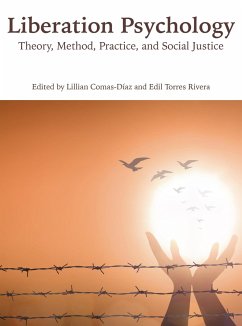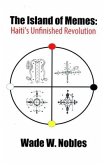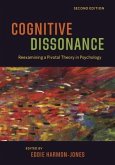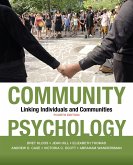Liberation Psychology
Theory, Method, Practice, and Social Justice
Herausgeber: Comas-Díaz, Lillian; Torres Rivera, Edil
Liberation Psychology
Theory, Method, Practice, and Social Justice
Herausgeber: Comas-Díaz, Lillian; Torres Rivera, Edil
- Broschiertes Buch
- Merkliste
- Auf die Merkliste
- Bewerten Bewerten
- Teilen
- Produkt teilen
- Produkterinnerung
- Produkterinnerung
Liberation Psychology: Theory, Method, Practice, and Social Justice guides readers through the history, theory, methods, and clinical practice of liberation psychology and its relation to social justice activism and movements.
Andere Kunden interessierten sich auch für
![Ethnocultural Factors in Substance Abuse Treatment Ethnocultural Factors in Substance Abuse Treatment]() Ethnocultural Factors in Substance Abuse Treatment60,99 €
Ethnocultural Factors in Substance Abuse Treatment60,99 €![The Island of Memes: Haiti's Unfinished Revolution The Island of Memes: Haiti's Unfinished Revolution]() Wade W. NoblesThe Island of Memes: Haiti's Unfinished Revolution21,99 €
Wade W. NoblesThe Island of Memes: Haiti's Unfinished Revolution21,99 €![Culture and Attachment Culture and Attachment]() Robin L HarwoodCulture and Attachment40,99 €
Robin L HarwoodCulture and Attachment40,99 €![The Social Psychology of Group Identity and Social Conflict: Theory, Application, and Practice The Social Psychology of Group Identity and Social Conflict: Theory, Application, and Practice]() The Social Psychology of Group Identity and Social Conflict: Theory, Application, and Practice24,99 €
The Social Psychology of Group Identity and Social Conflict: Theory, Application, and Practice24,99 €![Psychology and Social Problems (Psychology Revivals) Psychology and Social Problems (Psychology Revivals)]() Michael ArgylePsychology and Social Problems (Psychology Revivals)76,99 €
Michael ArgylePsychology and Social Problems (Psychology Revivals)76,99 €![Cognitive Dissonance Cognitive Dissonance]() Cognitive Dissonance64,99 €
Cognitive Dissonance64,99 €![Community Psychology Community Psychology]() Bret KloosCommunity Psychology68,99 €
Bret KloosCommunity Psychology68,99 €-
-
-
Liberation Psychology: Theory, Method, Practice, and Social Justice guides readers through the history, theory, methods, and clinical practice of liberation psychology and its relation to social justice activism and movements.
Hinweis: Dieser Artikel kann nur an eine deutsche Lieferadresse ausgeliefert werden.
Hinweis: Dieser Artikel kann nur an eine deutsche Lieferadresse ausgeliefert werden.
Produktdetails
- Produktdetails
- Verlag: American Psychological Association (APA)
- Seitenzahl: 314
- Erscheinungstermin: 28. Juli 2020
- Englisch
- Abmessung: 251mm x 175mm x 18mm
- Gewicht: 590g
- ISBN-13: 9781433832086
- ISBN-10: 1433832089
- Artikelnr.: 58023044
- Herstellerkennzeichnung
- Libri GmbH
- Europaallee 1
- 36244 Bad Hersfeld
- 06621 890
- Verlag: American Psychological Association (APA)
- Seitenzahl: 314
- Erscheinungstermin: 28. Juli 2020
- Englisch
- Abmessung: 251mm x 175mm x 18mm
- Gewicht: 590g
- ISBN-13: 9781433832086
- ISBN-10: 1433832089
- Artikelnr.: 58023044
- Herstellerkennzeichnung
- Libri GmbH
- Europaallee 1
- 36244 Bad Hersfeld
- 06621 890
Lillian Comas-Diaz, PhD, is a clinical psychologist in private practice and a clinical professor in the Department of Psychiatry and Behavioral Sciences at George Washington University. The author of over a hundred publications, Dr. Comas-Díaz is also the coeditor of Latina Psychologists: Thriving in the Cultural Borderlands, Womanist and Mujerista Psychologies, and Psychological Health of Women of Color. Dr. Comas-Díaz is the founding editor of Cultural Diversity and Ethnic Minority Psychology, the official journal of the Society for the Psychological Study of Ethnic Minority Issues (Division 45 of the American Psychological Association). She is an associate editor of the American Psychologist. Edil Torres Rivera, PhD, is a professor in the Department of Counseling, Educational Leadership, Educational and School Psychology; and Director of the Latinx Studies program at Wichita State University, Kansas. His primary research focuses include complexity and the use of indigenous healing techniques as a necessary element in psychological work with ethnic minority populations in the United States. He serves on the editorial board of the Journal for Social Action in Counseling and Psychology and is the editor of the Interamerican Journal of Psychology.
Series Foreword
Frederick T. L. Leong
Foreword: How APA Has Promoted Social Justice
Melba J. T. Vasquez
Introduction
Edil Torres Rivera and Lillian Comas-Díaz
Part I. Liberation Psychology Theory
1. Liberation Psychology: Origins and Development
Mark Burton and Raquel Guzzo
2. Concepts of Liberation Psychology
Edil Torres Rivera
3. Liberation Psychology and Racism
Raúl Quiñones-Rosado
Part II. Liberation Psychology Method
4. From Freud to Fanon to Freire: Psychoanalysis as a Liberation Method
Daniel Gaztambide
5. Liberation Psychology of and for Transformative Justice: Centering
Acompañamiento in Participatory Action Research
Jesica Siham Fernández
6. Feminist Participatory Action Research: Coconstructing Liberation
Psychological Praxis Through Dialogic Relationality and Critical
Reflexivity
M. Brinton Lykes and Gabriela Távara
Part III. Liberation Psychology Clinical Practice
7. Testimonios
Alejandro Cervantes
8. Urban Liberation: Postcolonial Intersectional Feminism and Developing a
Socially Conscious Therapeutic Practice
Chakira M. Haddock-Lazala
9. Liberation Psychotherapy
Lillian Comas-Díaz
Part IV. Liberation Psychology and Special Populations
10. Black Minds Matter: Applying Liberation Psychology to Black Americans
Thema Bryant-Davis and Shavonne J. Moore-Lobban
11. Liberation Psychology and LGBTQ+ Communities: Naming Colonization,
Uplifting Resilience, and Reclaiming Ancient His-stories, Her-stories, and
T-stories
Anneliese A. Singh, Brean’a Parker, Anushka R. Aqil, and Falon Thacker
12. Transnational Feminist Liberation Psychology: Decolonizing Border
Crossings
Kathryn L. Norsworthy and Ouyporn Khuankaew
Part V. Liberation Psychology Social Action
13. Liberation Psychology, Creativity, and Arts-Based Activism and
Artivism: Culturally Meaningful Methods Connecting Personal Development and
Social Change
Ester R. Shapiro
14. Liberation, Inspiration, and Critical Consciousness: Preparing the Next
Generation of Practitioners
Carrie Castañeda-Sound, Daryl M. Rowe, Nahaal Binazir, and Marlene L.
Cabrera
Conclusion. Liberation Psychology—Crossing Borders Into New Frontiers
Lillian Comas-Díaz and Edil Torres Rivera
Frederick T. L. Leong
Foreword: How APA Has Promoted Social Justice
Melba J. T. Vasquez
Introduction
Edil Torres Rivera and Lillian Comas-Díaz
Part I. Liberation Psychology Theory
1. Liberation Psychology: Origins and Development
Mark Burton and Raquel Guzzo
2. Concepts of Liberation Psychology
Edil Torres Rivera
3. Liberation Psychology and Racism
Raúl Quiñones-Rosado
Part II. Liberation Psychology Method
4. From Freud to Fanon to Freire: Psychoanalysis as a Liberation Method
Daniel Gaztambide
5. Liberation Psychology of and for Transformative Justice: Centering
Acompañamiento in Participatory Action Research
Jesica Siham Fernández
6. Feminist Participatory Action Research: Coconstructing Liberation
Psychological Praxis Through Dialogic Relationality and Critical
Reflexivity
M. Brinton Lykes and Gabriela Távara
Part III. Liberation Psychology Clinical Practice
7. Testimonios
Alejandro Cervantes
8. Urban Liberation: Postcolonial Intersectional Feminism and Developing a
Socially Conscious Therapeutic Practice
Chakira M. Haddock-Lazala
9. Liberation Psychotherapy
Lillian Comas-Díaz
Part IV. Liberation Psychology and Special Populations
10. Black Minds Matter: Applying Liberation Psychology to Black Americans
Thema Bryant-Davis and Shavonne J. Moore-Lobban
11. Liberation Psychology and LGBTQ+ Communities: Naming Colonization,
Uplifting Resilience, and Reclaiming Ancient His-stories, Her-stories, and
T-stories
Anneliese A. Singh, Brean’a Parker, Anushka R. Aqil, and Falon Thacker
12. Transnational Feminist Liberation Psychology: Decolonizing Border
Crossings
Kathryn L. Norsworthy and Ouyporn Khuankaew
Part V. Liberation Psychology Social Action
13. Liberation Psychology, Creativity, and Arts-Based Activism and
Artivism: Culturally Meaningful Methods Connecting Personal Development and
Social Change
Ester R. Shapiro
14. Liberation, Inspiration, and Critical Consciousness: Preparing the Next
Generation of Practitioners
Carrie Castañeda-Sound, Daryl M. Rowe, Nahaal Binazir, and Marlene L.
Cabrera
Conclusion. Liberation Psychology—Crossing Borders Into New Frontiers
Lillian Comas-Díaz and Edil Torres Rivera
Series Foreword
Frederick T. L. Leong
Foreword: How APA Has Promoted Social Justice
Melba J. T. Vasquez
Introduction
Edil Torres Rivera and Lillian Comas-Díaz
Part I. Liberation Psychology Theory
1. Liberation Psychology: Origins and Development
Mark Burton and Raquel Guzzo
2. Concepts of Liberation Psychology
Edil Torres Rivera
3. Liberation Psychology and Racism
Raúl Quiñones-Rosado
Part II. Liberation Psychology Method
4. From Freud to Fanon to Freire: Psychoanalysis as a Liberation Method
Daniel Gaztambide
5. Liberation Psychology of and for Transformative Justice: Centering
Acompañamiento in Participatory Action Research
Jesica Siham Fernández
6. Feminist Participatory Action Research: Coconstructing Liberation
Psychological Praxis Through Dialogic Relationality and Critical
Reflexivity
M. Brinton Lykes and Gabriela Távara
Part III. Liberation Psychology Clinical Practice
7. Testimonios
Alejandro Cervantes
8. Urban Liberation: Postcolonial Intersectional Feminism and Developing a
Socially Conscious Therapeutic Practice
Chakira M. Haddock-Lazala
9. Liberation Psychotherapy
Lillian Comas-Díaz
Part IV. Liberation Psychology and Special Populations
10. Black Minds Matter: Applying Liberation Psychology to Black Americans
Thema Bryant-Davis and Shavonne J. Moore-Lobban
11. Liberation Psychology and LGBTQ+ Communities: Naming Colonization,
Uplifting Resilience, and Reclaiming Ancient His-stories, Her-stories, and
T-stories
Anneliese A. Singh, Brean’a Parker, Anushka R. Aqil, and Falon Thacker
12. Transnational Feminist Liberation Psychology: Decolonizing Border
Crossings
Kathryn L. Norsworthy and Ouyporn Khuankaew
Part V. Liberation Psychology Social Action
13. Liberation Psychology, Creativity, and Arts-Based Activism and
Artivism: Culturally Meaningful Methods Connecting Personal Development and
Social Change
Ester R. Shapiro
14. Liberation, Inspiration, and Critical Consciousness: Preparing the Next
Generation of Practitioners
Carrie Castañeda-Sound, Daryl M. Rowe, Nahaal Binazir, and Marlene L.
Cabrera
Conclusion. Liberation Psychology—Crossing Borders Into New Frontiers
Lillian Comas-Díaz and Edil Torres Rivera
Frederick T. L. Leong
Foreword: How APA Has Promoted Social Justice
Melba J. T. Vasquez
Introduction
Edil Torres Rivera and Lillian Comas-Díaz
Part I. Liberation Psychology Theory
1. Liberation Psychology: Origins and Development
Mark Burton and Raquel Guzzo
2. Concepts of Liberation Psychology
Edil Torres Rivera
3. Liberation Psychology and Racism
Raúl Quiñones-Rosado
Part II. Liberation Psychology Method
4. From Freud to Fanon to Freire: Psychoanalysis as a Liberation Method
Daniel Gaztambide
5. Liberation Psychology of and for Transformative Justice: Centering
Acompañamiento in Participatory Action Research
Jesica Siham Fernández
6. Feminist Participatory Action Research: Coconstructing Liberation
Psychological Praxis Through Dialogic Relationality and Critical
Reflexivity
M. Brinton Lykes and Gabriela Távara
Part III. Liberation Psychology Clinical Practice
7. Testimonios
Alejandro Cervantes
8. Urban Liberation: Postcolonial Intersectional Feminism and Developing a
Socially Conscious Therapeutic Practice
Chakira M. Haddock-Lazala
9. Liberation Psychotherapy
Lillian Comas-Díaz
Part IV. Liberation Psychology and Special Populations
10. Black Minds Matter: Applying Liberation Psychology to Black Americans
Thema Bryant-Davis and Shavonne J. Moore-Lobban
11. Liberation Psychology and LGBTQ+ Communities: Naming Colonization,
Uplifting Resilience, and Reclaiming Ancient His-stories, Her-stories, and
T-stories
Anneliese A. Singh, Brean’a Parker, Anushka R. Aqil, and Falon Thacker
12. Transnational Feminist Liberation Psychology: Decolonizing Border
Crossings
Kathryn L. Norsworthy and Ouyporn Khuankaew
Part V. Liberation Psychology Social Action
13. Liberation Psychology, Creativity, and Arts-Based Activism and
Artivism: Culturally Meaningful Methods Connecting Personal Development and
Social Change
Ester R. Shapiro
14. Liberation, Inspiration, and Critical Consciousness: Preparing the Next
Generation of Practitioners
Carrie Castañeda-Sound, Daryl M. Rowe, Nahaal Binazir, and Marlene L.
Cabrera
Conclusion. Liberation Psychology—Crossing Borders Into New Frontiers
Lillian Comas-Díaz and Edil Torres Rivera








